Over 5 million Americans now live overseas, and the number keeps growing. Whether it’s for retirement, work, or a better quality of life, more U.S. citizens are exploring international relocation.
The best countries to move to from the USA offer affordable living, excellent healthcare, and accessible residency options.
In this guide, we reveal the top 25 destinations for American expats, including insights on visa types, cost of living, and what makes these places stand out for individuals, digital nomads, and families alike.
25 Best Countries for Americans to Move to From USA
According to the Global Citizen Solutions Intelligence Unit (GIU), American expatriation is rising for a variety of reasons, including employment opportunities, cost of living, safety, retirement options, healthcare systems, education, or simply the desire for a fresh start in a new country.
Here is a selection of some of the top countries for American expats with their cost of living and visa options:
1. Portugal

The cost of living is about 30% lower than in the US, and real estate is 50% cheaper, making it a practical choice for both families and retirees alike.
Immigration is less complicated than in most countries, with options like the Portugal D7 Visa specifically for retirees, the Portugal Digital Nomad Visa for those looking for a remote working option, and the Portugal Golden Visa, which also allows family sponsorship.
U.S. expats in Portugal can benefit from tax-free cryptocurrency regulations, a low-crime environment, and stunning beaches. English is also widely spoken in major cities like Lisbon and Porto, making it easier for newcomers to settle and enjoy Portugal’s rich culture and welcoming atmosphere.
Visa options and costs
Visa Type | Minimum Investment Requirement | Application Fees (Single Applicant) | Application Fees (Couple) | Application Fees (Family of Four) |
Golden Visa | €250,000 in restoring cultural sites, research and development | €5,325 | €10,650 | €21,300 |
D7 Visa | Proof of passive income that is equivalent to Portugal's minimum wage. | €90 | €180 | €360 |
Digital Nomad Visa | Proof of a monthly remote work income of €3,480 | €90 | €180 | €360 |
Cost of living
- Estimated monthly expenses: $1,500 – $2,500
- Housing costs for a 1-bedroom apartment: $600 – $1,200
- Average utilities and grocery costs: $100 – $150 (utilities), $200 – $350 (groceries)
- Healthcare: Public healthcare is subsidized while private plans cost $22–$55/month.
2. Spain

The Spain Non-Lucrative Visa is ideal for those who wish to reside in Spain without working, in other words retirees, provided they can prove they have enough money to support themselves.
Spain offers a high quality of life, with 50% cheaper rent than in the U.S. and 24% lower dining costs. Expats with a Spain visa can travel within Europe as the country is a part of the Schengen area.
While most of the population doesn’t speak English, it’s a common language used in major cities and tourist spots. With affordable living, stunning landscapes, and a friendly atmosphere, Spain is a great place to move to.
Visa options and costs
Visa Type | Minimum Investment Requirement | Application Fees (Single Applicant) | Application Fees (Couple) | Application Fees (Family of Four) |
Spain Non-Lucrative Visa | Proof of sufficient funds (€2,650) | €140 | €280 | €560 |
Cost of living
- Estimated monthly expenses: $1,800 – $2,800
- Housing costs for a 1-bedroom apartment: $700 – $1,500
- Average utilities and grocery costs: $100 – $150 (utilities), $250 – $400 (groceries)
- Healthcare: Public healthcare is free or low-cost; private plans $55–$220/month.
3. Cyprus
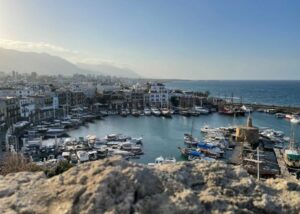
Cyprus provides tax benefits, including one of the lowest income tax rates among European countries, starting at just 12.5%, which is ideal for those looking for financial advantages when moving abroad.
The Cyprus Golden Visa offers US citizens residency through real estate investment, providing a great opportunity to acquire property. English is widely spoken with the country ranking 29th on the English Proficiency Index, making it an appealing destination for American expats.
Cyprus also offers political stability, a strong work-life balance, and access to top-quality international schools, making it one of the top countries for American families to live in.
Visa options and costs
Visa Type | Minimum Investment Requirement | Application Fees (Single Applicant) | Application Fees (Couple) | Application Fees (Family of Four) |
Golden Visa | €300,000 in real estate | €500 | €1,000 | €2,000 |
Cost of living
- Estimated monthly expenses: $1,500 – $2,500
- Housing costs for a 1-bedroom apartment: $600 – $1,200
- Average utilities and grocery costs: $100 – $200 (utilities), $250 – $400 (groceries)
- Healthcare: Public healthcare is subsidized for residents; private insurance plans range from $22–$110/month with affordable out-of-pocket costs for private doctors and clinics.
4. Greece

The Greece Golden Visa program allows U.S. nationals to obtain residency through real estate investment. Additionally, Greece’s income tax rate starts at just 9%, one of the lowest in Europe, giving expats a financial advantage.
The Greece Digital Nomad Visa is another great option as it allows remote workers and freelancers to live and work in Greece while maintaining their income abroad.
In addition, the country has affordable healthcare, a low cost of living, and a favorable climate. English is widely spoken, especially in tourist areas and big cities. The welcoming atmosphere, excellent education options, and numerous leisure and business opportunities make Greece one of the top destinations for American expats.
Visa options and costs
Visa Type | Minimum Investment Requirement | Application Fees (Single Applicant) | Application Fees (Couple) | Application Fees (Family of Four) |
Golden Visa | €250,000 in real estate | €2000 per applicant | €4,000 | €8,000 |
Greece Digital nomad Visa | Proof of remote work income (€3,500 monthly) | €140 | €150 | €300 |
Cost of living
- Estimated monthly expenses: $1,800 – $2,800
- Housing costs for a 1-bedroom apartment: $700 – $1,500
- Average utilities and grocery costs: $100 – $150 (utilities), $250 – $400 (groceries)
- Healthcare: Public healthcare is free or low-cost; private plans $55–$220/month.
5. Malta

It’s especially appealing for retirees, with shorter flight times than other European countries – around 10 to 15 hours from the East Coast and 14 to 20 hours from the West Coast.
For easy migration, Malta’s Citizenship by Investment program allows U.S. nationals to easily relocate by simply making an economic contribution to the Maltese economy, with foreigners able to get a new passport in just 12 to 36 months.
Similarly, the Malta Residency by Investment scheme provides residency in exchange for an investment, which is perfect for expats who still want flexibility. Another option is the Malta Digital Nomad Visa, which allows remote workers to live and work in the country.
Public schools are free for all and follow a bilingual curriculum in English and Maltese. However, families seeking an exclusively English-language education might prefer to enroll their children in private international schools, which often follow British or International Baccalaureate curricula.
Visa options and costs
Visa Type | Minimum Investment Requirement | Application Fees (Single Applicant) | Application Fees (Couple) | Application Fees (Family of Four) |
Citizenship by Investment | €600,000 donation to National Development Fund + €700,000 property purchase or €16,000 annual rent | €10,000 | €20,000 | €40,000 |
Residency by investment | €375,000 property purchase. €14,000 annual lease and €2,000 donation | €10,000 | €20,000 | €40,000 |
Digital Nomad Visa | Proof of remote work income (€3,400 monthly) | €300 | €600 | €1,200 |
Cost of living
- Estimated monthly expenses: $1,245 – $2,860
- Housing costs for a 1-bedroom apartment: $700 – $1,500
- Average utilities and grocery costs: $100 – $200 (utilities), $300 – $600 (groceries)
- Healthcare: Public healthcare is available for residents; private plans range from $25–$50/month, with doctor visits costing around $10–$25 and specialists $60–$85.
6. Canada

The country offers multiple pathways to residency and citizenship, including the Temporary Foreign Worker Program (TFWP), which allows US citizens to work in the country temporarily and later apply for permanent residency through the Canadian Experience Class.
U.S. entrepreneurs can benefit from the Canada Startup Visa which is designed to support those looking to launch businesses in Canada’s strong and stable economy.
Public healthcare is free or subsidized, providing high-quality medical services without direct charges. Canada is a great country for Americans to settle in because English is one of its official languages, has a close proximity to the U.S., and its culturally similar so integration will be easier than in other countries.
Visa options and costs
Visa Type | Minimum Investment Requirement | Application Fees (Single Applicant) | Application Fees (Couple) | Application Fees (Family of Four) |
Start-Up Visa | Commitment from a designated organization; no minimum investment required by the government. | CAD $1,540 | CAD $3,080 | CAD $6,160 |
Temporary Foreign Worker Program | Job offer required | CAD $155 | CAD $310 | CAD $620 |
Cost of living
- Estimated monthly expenses: $2,500 – $3,500
- Housing costs for a 1-bedroom apartment: $1,200 – $2,000
- Average utilities and grocery costs: $100 – $150 (utilities), $300 – $500 (groceries)
- Healthcare: Public healthcare is free for residents; private optional.
7. Mexico
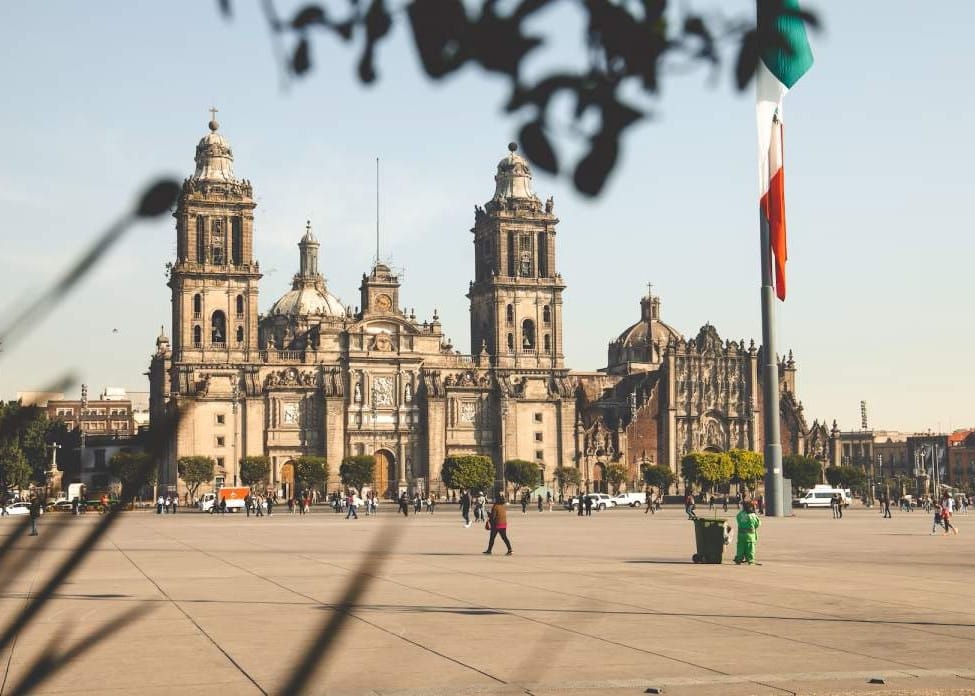
The Temporary Resident Visa lets people stay in the country for up to four years, making it a great option for remote workers or anyone with enough income to support themselves while staying in Mexico.
If they can prove financial stability, retirees can apply for a Retirement Visa. Additionally, English is common in tourist areas but less so in rural parts, making it both welcoming and an unique cultural experience for U.S. expats.
Visa options and costs
Visa Type | Minimum Investment Requirement | Application Fees (Single Applicant) | Application Fees (Couple) | Application Fees (Family of Four) |
Temporary Residence Visa | Proof of monthly income of approximately USD $2,100 or savings of USD $36,000 | $36 | $72 | $144 |
Permanent Residence Visa | Proof of monthly income of approximately USD $2,700 or savings of USD $108,000 | $36 | $72 | USD $144 |
Cost of living
- Estimated monthly expenses: $1,200 – $2,000
- Housing costs for a 1-bedroom apartment: $500 – $1,000
- Average utilities and grocery costs: $50 – $100 (utilities), $200 – $300 (groceries)
- Healthcare: Public care is low-cost; private care ~$25–$75/month.
8. New Zealand
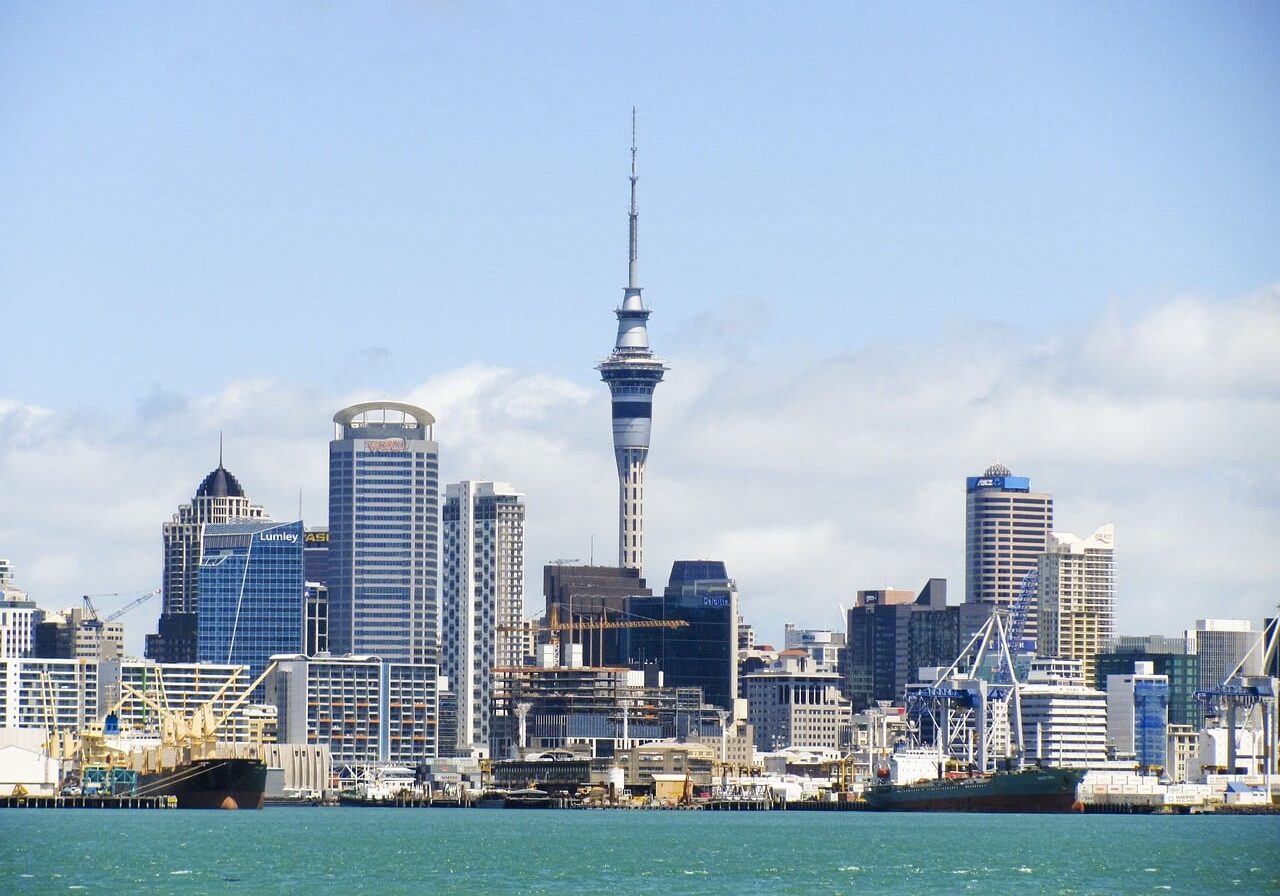
The country has a top healthcare system, which makes it an attractive destination for U.S. expats. You can apply for the Essential Skills Work Visa, which allows foreign workers to fill skill shortages within the country and provides a pathway to permanent residency.
New Zealand stands out for its welcoming culture and emphasis on work-life balance.
The low crime rate and abundant job opportunities, especially in healthcare, IT, and construction, make it an ideal destination for Americans looking to live abroad. English is also a widely spoken language which would make integration for U.S. expats smooth.
Visa options and costs
Visa Type | Minimum Investment Requirement | Application Fees (Single Applicant) | Application Fees (Couple) | Application Fees (Family of Four) |
Essential Skills Work Visa | Job offer in an occupation listed on the Essential Skills in Demand Lists | NZD $495 | NZD $990 | NZD $1,980 |
Cost of living
- Estimated monthly expenses: $2,500 – $3,500
- Housing costs for a 1-bedroom apartment: $1,200 – $1,800
- Average utilities and grocery costs: $150 – $200 (utilities), $300 – $500 (groceries)
- Healthcare: Public healthcare is free or subsidized for residents.
9. Germany

Germany is especially great for skilled professionals looking to relocate abroad. The country offers many job opportunities, especially in fields like engineering, IT, and healthcare.
Germany’s Freelance Visa is perfect for freelancers, allowing them to live and work if they can prove they have clients or business prospects.
In addition to job opportunities, Germany offers excellent public services, infrastructure, and a deep cultural heritage. The country also emphasizes environmental sustainability, which makes it an attractive choice for those looking to live in a forward-thinking nation.
While German is the official language, English is spoken widely in a lot in bigger cities. Germany ranks number 10 out of 116 countries on the English Proficiency Index.
Visa options and costs
Visa Type | Minimum Investment Requirement | Application Fees (Single Applicant) | Application Fees (Couple) | Application Fees (Family of Four) |
Essential Skills Work Visa | Proof of freelance work and sufficient funds | €60 | €120 | €240 |
Cost of living
- Estimated monthly expenses: $1,800 – $3,000
- Housing costs for a 1-bedroom apartment: $800 – $1,500
- Average utilities and grocery costs: $150 – $250 (utilities), $250 – $400 (groceries)
- Healthcare: Public insurance is income-based; private plans start at ~$165/month.
10. Australia

Cities like Sydney and Melbourne consistently rank high for liveability, offering a great quality of life.
The Temporary Skill Shortage Visa (subclass 482) allows employers to sponsor foreign workers for skilled positions for up to four years, which is a good pathway to living and working in Australia.
Beyond work opportunities in healthcare and IT, Australia offers a laid-back lifestyle with beautiful landscapes, from its famous beaches like Bondi to vast deserts.
Visa options and costs
Visa Type | Minimum Investment Requirement | Application Fees (Single Applicant) | Application Fees (Couple) | Application Fees (Family of Four) |
Essential Skills Work Visa | Sponsorship by an approved employer. | AUD $1,290 | AUD $2,580 | AUD $5,160 |
Cost of living
- Estimated monthly expenses: $2,500 – $4,000
- Housing costs for a 1-bedroom apartment: $1,500 – $2,500
- Average utilities and grocery costs: $150 – $250 (utilities), $300 – $500 (groceries)
- Healthcare: Public system (Medicare) for residents; private optional.
11. Panama
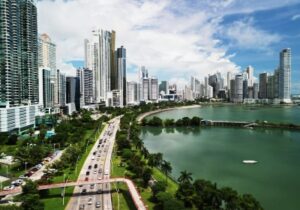
Panama provides a range of visa options, including the popular Pensionado Visa for retirees, which requires proof of a lifetime monthly income of just $1,000. For remote workers and entrepreneurs, the Friendly Nations Visa offers a pathway to residency with minimal bureaucratic hurdles.
With its modern infrastructure, U.S. dollar-based economy, and strong expat community, Panama is ideal for both retirees and digital nomads seeking financial ease and lifestyle comfort.
English is widely understood in urban and tourist areas, making integration relatively smooth for Americans adjusting to life abroad.
Visa options and costs
Visa Type | Minimum Investment Requirement | Application Fees (Single Applicant) | Application Fees (Couple) | Application Fees (Family of Four) |
Digital Nomad Visa | Proof of income of USD $3,000 monthly | USD $100 | USD $200 | USD $400 |
Retiree Visa | Proof of pension income of USD $1,000 monthly | USD $50 | USD $100 | USD $200 |
Cost of living
- Estimated monthly expenses: $1,200 – $2,000
- Housing costs for a 1-bedroom apartment: $500 – $900
- Average utilities and grocery costs: $50 – $100 (utilities), $200 – $300 (groceries)
- Healthcare: Affordable public care; expats often use low-cost private clinics.
12. Italy

The country offers two main residency options for foreigners: the Italy Digital Nomad Visa and the Italy Golden Visa.
The Digital Nomad Visa allows remote workers, freelancers, and digital entrepreneurs to live and work in Italy, primarily targeting skilled IT, marketing, and research professionals.
The Golden Visa offers residency by investment, which grants freedom of movement across the borders of European countries within the EU, no residency requirements, and the chance to live and work in one of Europe’s most beautiful countries. Additionally, English is understood in major cities and tourist areas.
Visa options and costs
Visa Type | Minimum Investment Requirement | Application Fees (Single Applicant) | Application Fees (Couple) | Application Fees (Family of Four) |
Digital Nomad Visa | Proof of remote work and sufficient income €2,066 | €116 | €232 | €464 |
Golden Visa | €250,000 in Italina start-ups | €2,000 | €4,000 | €8,000 |
Cost of living
- Estimated monthly expenses: $1,800 – $3,000
- Housing costs for a 1-bedroom apartment: $800 – $1,800
- Average utilities and grocery costs: $150 – $250 (utilities), $250 – $400 (groceries)
- Healthcare: Public healthcare is free or subsidized; private care optional.
13. Ireland

Furthermore, Ireland is known for its high-quality healthcare systems and a strong economy with growing job opportunities in tech and finance.
Visa options and costs
Visa Type | Minimum Investment Requirement | Application Fees (Single Applicant) | Application Fees (Couple) | Application Fees (Family of Four) |
Ireland STEP Visa | €50,000 investment for start-ups | €350 | €700 | €1,400 |
Cost of living
- Estimated monthly expenses: $2,000 – $3,500
- Housing costs for a 1-bedroom apartment: $1,500 – $2,000
- Average utilities and grocery costs: $150 – $300 (utilities), $300 – $500 (groceries)
- Healthcare: Public healthcare partially subsidized; private insurance recommended.
14. Dominica
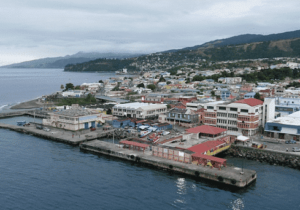
This small island has a mix of modern and colonial styles in its capital, Roseau, and its culture is influenced by African, European, and Caribbean traditions.
For Americans relocating to Dominica, the country offers a low cost of living, a safe and peaceful environment, and no taxes on global income, wealth, or inheritance. The affordable Dominica Citizenship by Investment program makes it even more appealing as you can get a second passport possible by just investing $200,000.
Since English is the official language, it’s easy for US citizens to settle and communicate here.
Visa options and costs
Visa Type | Minimum Investment Requirement | Application Fees (Single Applicant) | Application Fees (Couple) | Application Fees (Family of Four) |
Dominica CBI | Dominica CBI | $75,000 | +$25,000 | $100,000 |
Cost of living
- Estimated monthly expenses: $1,300 – $2,200
- Housing costs for a 1-bedroom apartment: $600 – $1,200
- Average utilities and grocery costs: $100 – $200 (utilities), $300 – $500 (groceries)
- Healthcare: Public healthcare is basic and free; private services are limited and may lack advanced care. Many expats fly to nearby islands for complex procedures.
15. Antigua and Barbuda

It’s an excellent choice for Americans looking to relocate and maximize their tax benefits while living in a country with low crime rates.
Through the Antigua and Barbuda Citizenship by Investment program, you can quickly obtain citizenship quickly, enjoy visa-free travel to around 153 countries, and bring along family members as part of your application.
The country is also tax-friendly, with no wealth or global income taxes. English is the official language, so American expats will easily navigate life on the island.
Visa options and costs
Visa Type | Minimum Investment Requirement | Application Fees (Single Applicant) | Application Fees (Couple) | Application Fees (Family of Four) |
Antigua and Barbuda CBI | Antigua and Barbuda CBI | $10,000 | $20,00 | $40,000 |
Cost of living
- Estimated monthly expenses: $1,500 – $2,500
- Housing costs for a 1-bedroom apartment: $700 – $1,000 (city center), $500 – $700 (outside center)
- Average utilities and grocery costs: $300 – $400 (utilities), $800 – $1,000 (groceries)
- Healthcare: Public primary care is available through the national Medical Benefits Scheme; private clinic visits cost $40–$80. Expats often use private insurance, which ranges from $240–$375/month including emergency evacuation coverage.
16. St. Kitts and Nevis

A US citizen can gain second citizenship and a Caribbean passport in about six months without residency requirements through the St. Kitts and Nevis Citizenship by Investment Program.
This passport allows visa-free travel to over 140 countries and benefits like dual citizenship and citizenship by descent for future generations. With English as the official language, American expats will find it easy to settle and connect with locals.
Visa options and costs
Visa Type | Minimum Investment Requirement | Application Fees (Single Applicant) | Application Fees (Couple) | Application Fees (Family of Four) |
St. Kitts and Nevis CBI | Investment of USD $250,000 | $25,00 | $40,00 | $70,000 |
Cost of living
- Estimated monthly expenses: $1,100 – $2,000
- Housing costs for a 1-bedroom apartment: $850 (city center), $600 (outside center)
- Average utilities and grocery costs: $150 – $250 (utilities), $400 – $600 (groceries)
- Healthcare: Basic public care is available with upfront payment; private clinic visits cost $50–$100. Expats typically use private international health insurance, which ranges from $200–$500/month.
17. Switzerland

U.S. citizens are drawn to the country’s clean cities, excellent public services, and high salaries. English is widely spoken in major business centers like Zurich and Geneva.
Switzerland offers multiple work and residence visa options for Americans, particularly for highly skilled professionals and retirees with sufficient funds. The Swiss healthcare system is among the most advanced globally, and residents are required to hold private health insurance.
Visa options and costs
Visa Type | Minimum Requirement | Application Fees (Single Applicant) | Application Fees (Couple) | Application Fees (Family of Four) |
Residence Permit | Job offer or sufficient income | CHF 100–150 | CHF 150–200 | CHF 200–300 |
Retirement Residency | Proof of income and health insurance | CHF 150 | CHF 200 | CHF 250 |
Cost of living
- Estimated monthly expenses: $3,200 – $4,500
- Housing costs for a 1-bedroom apartment: $1,500 – $3,000
- Average utilities and grocery costs: $220 (utilities), $500 – $700 (groceries)
- Healthcare: Mandatory private insurance ($400–600/month) provides access to world-class care.
18. Denmark

Copenhagen is a favorite among expats due to its work-life balance and quality healthcare. English is widely spoken, making integration easier for Americans.
U.S. expats can apply for a residence permit via work contracts, study programs, or the Start-up Denmark visa. Denmark also supports family reunification for partners and children.
Visa options and costs
Visa Type | Minimum Requirement | Application Fees (Single Applicant) | Application Fees (Couple) | Application Fees (Family of Four) |
Work Visa | Job contract from Danish employer | DKK 1,890 | DKK 2,835 | DKK 3,780 |
Start-up Visa | Innovative business plan + DKK 137,076 in funds | DKK 1,890 | DKK 2,835 | DKK 3,780 |
Cost of living
- Estimated monthly expenses: $2,300 – $3,300
- Housing costs for a 1-bedroom apartment: $1,075 – $1,580
- Average utilities and grocery costs: $215 (utilities), $300 – $400 (groceries)
- Healthcare: Public healthcare is tax-funded with low out-of-pocket expenses.
19. The Netherlands

The Dutch Highly Skilled Migrant visa allows U.S. professionals to live and work in the country, while remote workers and business owners can explore self-employment permits. English proficiency is very high, and public services are efficient.
Visa options and costs
Visa Type | Minimum Requirement | Application Fees (Single Applicant) | Application Fees (Couple) | Application Fees (Family of Four) |
Highly Skilled Migrant | Employment contract & minimum salary (~€5,000/month) | €350 | €525 | €700 |
Self-Employment | Viable business plan and proof of income | €350 | €525 | €700 |
Cost of living
- Estimated monthly expenses: $2,000 – $3,200
- Housing costs for a 1-bedroom apartment: $1,000 – $1,600
- Average utilities and grocery costs: $150 – $220 (utilities), $300 – $500 (groceries)
- Healthcare: Mandatory private insurance from ~$140/month; care is high quality.
20. Sweden

Americans can move to Sweden through work contracts, university admission, or family reunification. Swedish residency offers access to universal healthcare, free education, and stable governance. English is widely spoken across the country.
Visa options and costs
Visa Type | Minimum Requirement | Application Fees (Single Applicant) | Application Fees (Couple) | Application Fees (Family of Four) |
Work Permit | Employment offer and minimum salary | SEK 2,000 | SEK 3,000 | SEK 4,000 |
Family Reunification | Proof of relationship and support | SEK 1,500 | SEK 2,250 | SEK 3,000 |
Cost of living
- Estimated monthly expenses: $2,000 – $3,200
- Housing costs for a 1-bedroom apartment: $900 – $1,600
- Average utilities and grocery costs: $150 – $250 (utilities), $300 – $450 (groceries)
- Healthcare: Tax-funded universal system with low co-payments.
21. Finland

U.S. citizens can move to Finland for work, study, or family ties. The country also supports startup migration through the Finnish Startup Permit. English is widely used in business and academia.
Visa options and costs
Visa Type | Minimum Requirement | Application Fees (Single Applicant) | Application Fees (Couple) | Application Fees (Family of Four) |
Work Residence Permit | Job offer and proof of sufficient income | €490 | €735 | €980 |
Start-up Permit | Scalable business idea and funding | €490 | €735 | €980 |
Cost of living
- Estimated monthly expenses: $1,800 – $2,800
- Housing costs for a 1-bedroom apartment: $800 – $1,400
- Average utilities and grocery costs: $120 – $200 (utilities), $250 – $400 (groceries)
- Healthcare: Publicly funded with affordable access for residents.
22. Norway

Americans can apply for work or family reunification visas, with a strong emphasis on proof of financial means. Norway also has a digital nomad-friendly approach to remote workers staying short term.
Visa options and costs
Visa Type | Minimum Requirement | Application Fees (Single Applicant) | Application Fees (Couple) | Application Fees (Family of Four) |
Skilled Worker Visa | Job offer and minimum salary (~NOK 417,900/year) | NOK 6,300 | NOK 9,450 | NOK 12,600 |
Family Immigration | Relationship and housing or income proof | NOK 10,500 | NOK 15,750 | NOK 21,000 |
Cost of living
- Estimated monthly expenses: $2,300 – $3,700
- Housing costs for a 1-bedroom apartment: $1,100 – $1,900
- Average utilities and grocery costs: $180 – $260 (utilities), $300 – $500 (groceries)
- Healthcare: Universal public system with low co-pays.
23. Luxembourg

U.S. expats benefit from fast internet, international schools, and excellent public transportation. Residence permits are available for employment, self-employment, and family reunification.
Visa options and costs
Visa Type | Minimum Requirement | Application Fees (Single Applicant) | Application Fees (Couple) | Application Fees (Family of Four) |
Salaried Worker | Valid work contract and accommodation | €80 | €120 | €160 |
Self-Employed | Business plan and income | €80 | €120 | €160 |
Cost of living
- Estimated monthly expenses: $2,200 – $3,500
- Housing costs for a 1-bedroom apartment: $1,200 – $1,800
- Average utilities and grocery costs: $180 – $250 (utilities), $350 – $500 (groceries)
- Healthcare: Public-private hybrid system; mandatory insurance.
24. Belgium

Americans can relocate through employment, family, or investment routes. The Professional Card is a common path for self-employed individuals.
Visa options and costs
Visa Type | Minimum Requirement | Application Fees (Single Applicant) | Application Fees (Couple) | Application Fees (Family of Four) |
Work Permit B | Employment contract and sponsorship | €180 | €270 | €360 |
Professional Card | Business plan approval | €140 | €210 | €280 |
Cost of living
- Estimated monthly expenses: $2,000 – $3,200
- Housing costs for a 1-bedroom apartment: $900 – $1,400
- Average utilities and grocery costs: $150 – $200 (utilities), $300 – $450 (groceries)
- Healthcare: Public health insurance system with optional top-up plans.
25. Slovenia
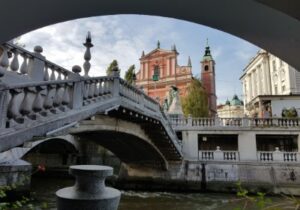
Americans can move via work contracts, entrepreneurship, or study. Slovenia’s residence permit options make it easy to integrate for those with means or EU family connections.
Visa options and costs
Visa Type | Minimum Requirement | Application Fees (Single Applicant) | Application Fees (Couple) | Application Fees (Family of Four) |
Work/Employment Visa | Job offer and residence proof | €77 | €115 | €153 |
Self-Employment Visa | Sole proprietor registration and proof of income | €77 | €115 | €153 |
Cost of living
- Estimated monthly expenses: $1,200 – $2,200
- Housing costs for a 1-bedroom apartment: $500 – $900
- Average utilities and grocery costs: $100 – $150 (utilities), $200 – $350 (groceries)
- Healthcare: Public healthcare available to residents; private coverage optional.
8 Things to Consider Before Moving out of the USA
There are many appeals to moving out of the U.S., but before taking this step, make sure you have covered all your bases and considered these key things before packing up to another country.
1. Daily living expenses
Understanding the full cost of living is crucial when choosing a new country. Look beyond rent and compare expenses like utilities, groceries, transportation, and leisure.
Countries such as Mexico, Portugal, and Costa Rica offer significantly lower living costs than the U.S., making them ideal for retirees, digital nomads, and young professionals with a limited relocation budget.
Also, be aware of visa requirements, such as minimum proof of income, passive income, or sufficient financial resources, which id common for options like the retirement visa or digital nomad visa.
2. Travel
One of the advantages of U.S. citizenship is visa-free or visa-on-arrival access to over 180 countries. However, for even greater flexibility, consider getting a second passport through citizenship by investment.
A second passport can open doors to additional countries, particularly in the EU or Caribbean, that may have travel restrictions for U.S. citizens alone.
3. Work and business opportunities
If you’re planning to work, start a business, or freelance, ensure your destination offers relevant work permits, entrepreneur visas, or Golden Visa programs.
Countries like Greece, Portugal, and Cyprus provide real estate or business investment routes to residency, allowing you to legally live and work as a permanent resident.
These options are particularly attractive to expats with transferable skills or remote work capabilities looking to tap into new markets.
4. Family benefits
For those relocating with spouses, children, or dependent parents, access to quality education and healthcare is vital.
Countries like Canada, Ireland, and Portugal are known for their excellent public schools, international education options, and strong family-friendly infrastructure.
Also, look for destinations that offer English-speaking support services and safe residential areas with good amenities for kids.
5. Safety
Safety concerns are a major driver of American expatriation, especially for families and retirees.
Nations in Western Europe, like Switzerland, Austria, and Finland, are some of the safest countries in the world, consistently ranking high in global safety indexes and offer a peaceful environment with low crime rates.
When evaluating your options, review trends in crime, political stability, and social unrest to ensure long-term security.
6. Health insurance
Access to quality medical services is essential particularly for those with pre-existing conditions, children, or senior dependents.
While U.S. citizens may retain some health insurance benefits abroad, most expats rely on local healthcare systems or international health insurance with global coverage and evacuation services.
Countries with universal healthcare like Spain, France, and Germany provide comprehensive, affordable care through public and private options.
7. Laws and taxation
U.S. citizens are taxed on worldwide income, meaning you’ll still file taxes even if you’re a permanent resident elsewhere. Fortunately, the U.S. has double taxation treaties with over 60 countries and offers exclusions like the Foreign Earned Income Exclusion (FEIE).
Still, it’s critical to review local tax rules. Some countries have high income or capital gains taxes, while others offer favorable tax regimes for foreign residents.
8. Language and culture
Adjusting to a new language and culture is part of the challenge and joy of life abroad. Countries like Germany, France, and Japan may require basic language skills for residency or citizenship.
However, if you’re looking for easier integration, consider destinations with high English proficiency such as the Netherlands, Ireland, or Malta.
Your ability to adapt to new customs and social norms will shape how deeply you integrate or whether you stay within the expat bubble.
Explore Global Citizenship: Key Insights and Options
Navigating the complexities of citizenship, passport acquisition, and immigration can be a daunting task. Whether you're considering a move for business, personal, or security reasons, understanding your options is crucial. At Global Citizen Solutions, we specialize in providing clear, comprehensive guidance in these areas. Our expertly crafted articles offer deep insights and comparisons to help you make informed decisions.
-
Exploring Citizenship by Investment: For those interested in acquiring citizenship through investment, our guide on citizenship through investment breaks down the process, benefits, and key considerations, helping you understand how this path might suit your personal and financial goals.
-
Comparing Citizenship by Investment Programs: Choosing the right program is vital. Our comprehensive comparison of CBI programs worldwide provides a clear, side-by-side look at what each country offers, aiding you in finding the perfect match for your needs.
-
Top Citizenship by Investment Programs: To further assist your decision-making, we've curated a list of the best citizenship by investment programs available. This resource is invaluable for anyone looking to understand which programs offer the most value, security, and benefits.
At Global Citizen Solutions, we're committed to helping you navigate the path to a new citizenship with ease and confidence. Explore our resources to gain a clearer understanding of your options and embark on your journey towards global citizenship.
Frequently Asked Questions about the Best Countries to Move to from USA
What are the best countries for Americans to move to in 2025?
The top countries for Americans to move to in 2025 include Portugal, Spain, Mexico, Canada, and Germany. These destinations offer affordable living, quality healthcare, and accessible visa pathways like digital nomad or retirement visas.
What are the top countries for American expats to live long-term?
Popular long-term destinations include Australia, Ireland, Switzerland, New Zealand, and the Netherlands, thanks to stable economies, strong expat communities, and high quality of life.
Which countries are best for American families moving abroad?
Canada, Portugal, Sweden, Denmark, and Ireland rank among the best for families due to safe environments, excellent public schools, and family-friendly immigration programs.
What are the safest countries for Americans to relocate to?
Some of the best countries for Americans to retire abroad include:
- Spain
- Portugal
- Costa Rica
- Uruguay
- Mexico
Top reasons for these countries include good healthcare systems, affordable cost of living, warm climates and safety.
Where do most American expats live in Europe?
Popular European hubs for Americans include Portugal (Lisbon), Spain (Barcelona and Madrid) and Germany (Berlin).
What are the top English-speaking countries for Americans to relocate to?
Some of the best English-speaking countries include Ireland, Canada, Australia, New Zealand, and Malta, all of which have minimal language barriers and easy cultural adaptation for U.S. citizens.
Which are some of the best countries for expats to retire?
According to Global Intelligence Unit’s Retirement Guide for U.S. Citizens, the top three countries for retirees from United States is:
- Spain
- Portugal
- Costa Rica
What countries welcome American digital nomads?
Countries with digital nomad visas ideal for Americans include Estonia, Portugal, Greece, Costa Rica, and Croatia, offering legal residency and internet-friendly infrastructure.
What are the easiest countries to move to from the USA with a work visa?
Some of the easiest countries for US citizens to move to with a work visa include:
- Canada: NAFTA/USMCA agreements.
- Mexico: straightforward temporary residence visas for employment.
- Germany: The EU Blue Card (also known as the EU Residence Permit) for highly skilled workers.
These countries also have clear paths to permanent residency and citizenship for foreign workers.
What are the best countries for raising children as a U.S. expat?
Countries like Sweden, Norway, Denmark, Finland, and Switzerland consistently rank high for raising children with their strong education systems, affordable healthcare, and good work-life balance.
Where can American families find good international schools?
Top countries with international schools include Switzerland, the Netherlands, Germany, Singapore, and the UAE, especially in cities with large expat communities.



